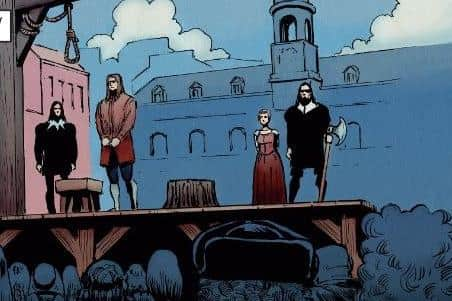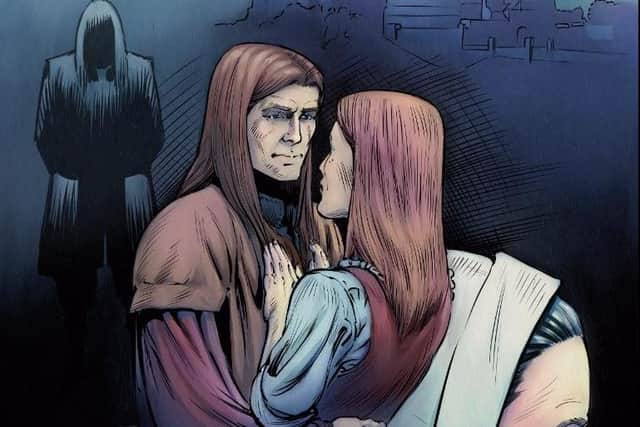Sex, lies and dastardly intentions in old Edinburgh brought back to life in Scottish history comic book
Set in 17th-century Edinburgh, it is raunchy, violent and full of intrigue and deception.
But it's not a new TV box set, it’s a graphically illustrated comic book.
Advertisement
Hide AdAdvertisement
Hide AdProduced by academics from the University of Dundee, The Persecution of Jean Lands charts the conviction of two lovers who plotted to kill the married man’s wife so they could be together.
The sensational trial, which took place in Edinburgh in 1694, saw the pair accused of “notorious adultery” and led to the prosecution of a third party – a doctor – as the full extent of the scheme was uncovered.
Now, 300 years on, the sensational story has been brought back to light after catching the eye of Scottish history lecturer Dr Allan Kennedy, who stumbled on it while sifting through National Records of Scotland archives.
Intrigued by the case’s twists and turns, Dr Kennedy – who is also consultant editor of History Scotland magazine – teamed up with colleague Professor Chris Murray, the university’s chair of Comic Studies, to bring the story to modern audiences.


“Comics are a great way of sharing history,” Dr Kennedy said.
“Because the illustrations carry so much detail, the storytelling can be incredibly efficient and that is hugely important when attracting a different kind of audience to that which may usually be drawn to history.
“This case is particularly interesting because it featured a charge that was quite rare and rather salacious.
“It also allows us to observe the social history of the time.


Advertisement
Hide AdAdvertisement
Hide Ad“Scottish history is often portrayed through the prism of a small number of famous events or figures.
“A case like this allows us to examine more everyday experiences, away from big battles or the royal court.
“As well as showing how the judicial system worked, the files I have accessed touch on the local economy of Edinburgh at the time, how male and female relationships worked, and also the role of the church in society.


“These are fascinating insights into everyday life that are often overlooked when we talk about Scottish history.”
The comic details the trial of lovers Daniel Nicholson and Marion Maxwell, who collude to kill Jean Lands, Nicholson’s wife.
The pair faced charges of “notorious adultery” – an extra-marital affair defined in Scots Law as especially open or flagrant – and a death sentence if convicted.
As investigations progressed, a third suspect was rounded up – an apothecary whose involvement led to forgery charges.
The historian says the sophistication of Scotland’s judicial system at that time may surprise readers.
Advertisement
Hide AdAdvertisement
Hide Ad“A large amount of care was taken in gathering evidence of guilt, and acquittals were not uncommon," he said.
“While there was undoubtedly a brutal and bloody element in sentencing severe crimes, the expectation we may have today of torturous punishments being handed out with little consideration is not wholly accurate.
“The records that were kept from legal proceedings are also very detailed, with depositions being recorded verbatim and indictments being written with colourful and evocative language.
“It is very different from the way criminal justice in the past is often portrayed in today’s popular media.”
The Persecution of Jean Land is available from History Scotland
Comments
Want to join the conversation? Please or to comment on this article.